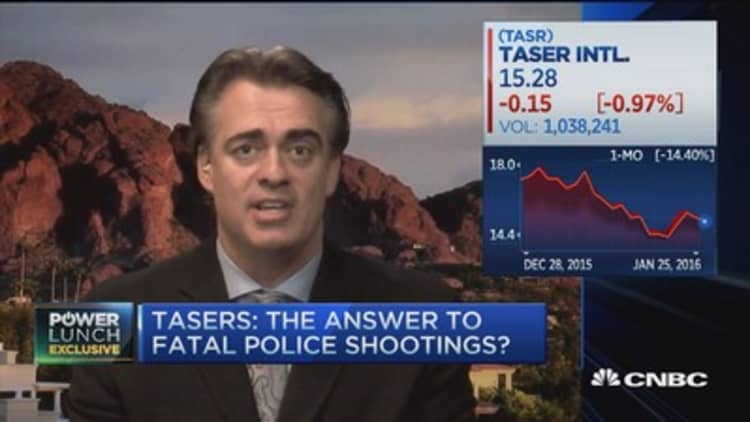Having notched big sales of body cameras to the police in Chicago, Minneapolis and Baltimore, Taser International has its sights set on an even bigger prize — the New York City Police Department.
The NYPD recently completed a 15-month pilot program of 54 officers in six precincts using Taser body cameras and a system from privately held rival Vievu, and now the agency is preparing a wider test involving about one-fourth of the city's precincts. Taser also has been awarded camera contracts in Los Angeles and Philadelphia.
"We've been laser focused on winning the biggest agencies on to our platform," Taser co-founder and CEO Rick Smith told analysts Wednesday during the company's first-quarter earnings call. "We may not win every opportunity, but we're certainly winning a dominant share."
Taser's Axon body camera and services segment has been a lucrative business for the Scottsdale, Arizona-based company and could drive growth for years to come as more police departments purchase the equipment. But a patent infringement lawsuit filed by a small competitor could potentially prove costly for Taser.
In January, Digital Ally of Lenexa, Kansas, sued Taser in federal court alleging patent infringement and seeking "a permanent injunction barring Taser from selling its infringing Axon products with Signal technology." The Kansas company is asking for monetary damages "in an amount no less than a reasonable royalty as well as its lost profits for Taser's infringement."
"We patently deny the frivolous accusations by Digital Ally and we'll address their claims appropriately in the courtroom," Taser said in a statement provided to CNBC. Digital Ally couldn't be reached for comment.
Taser stock climbed about 4 percent on Thursday after the company reported better-than-expected results . The stock is beating the broader market year-to-date, but is down nearly 50 percent from a year ago and was lower by more than 1 percent Friday.
Taser said it shipped more than 8,000 cameras in the quarter ended in March. Overall, Axon revenues were up 51 percent year-over-year, while the Taser weapons segment revenues grew almost 20 percent. Operating expenses soared 66 percent in the quarter, leading some analysts to caution investors.
"We've never denied the opportunity for Taser or its competitive advantages, but we worry investors aren't thinking through the impact of operating expenses spend to get there," Oppenheimer analyst Andrew Uerkwitz said in a research note Thursday. The analyst lowered his full-year 2017 estimates for Taser.
Meanwhile, Taser has been careful not to comment specifically on the NYPD program in order to avoid running afoul of what CEO Smith previously termed "pretty stringent guidelines" for vendors participating in the bidding process. Winning the expanded pilot contract would be significant for Taser and also could set the stage for the company to ultimately land a larger deal with the NYPD, which has a sworn force of about 36,000 officers.
"The next phase of the body camera pilot program will be to identify 20 precincts and deploy 20 cameras in each of these," an NYPD spokesperson wrote in response to an inquiry. "For this purpose we will be using cameras from a projected 1,000 supply we plan to obtain this summer. The request for proposal process for supply body cameras to the NYPD is still in the evaluation/review stage."
Last year, the Los Angeles Police Department — the nation's second largest police force — negotiated a five-year, $31.2 million deal with Taser. The agreement includes body cameras for 7,000 uniformed officers as well as stun guns made by Taser. Several L.A. City Council members have voiced concerns about the costs of the camera initiative, but L.A. Mayor Eric Garcetti convinced the Council to fund the program, and full deployment is now expected in late 2018.
The Boston Police Department also is aiming to launch a pilot program consisting of 100 cameras later this month or in early June. The vendor selection hasn't been finalized.

"Out of the total of 69 major cities in the U.S., 36 have made a decision on body-worn camera deployments," Taser President Luke Larson told analysts Wednesday during the conference call. "Of the 36 (cities), 29 of them have selected our Axon solution. And of the other seven cities, the market is fragmented among three other vendors."
In late 2014, President Barack Obama requested $263 million over three years to provide 50,000 body-worn cameras to police throughout the nation. It followed the civil unrest in Ferguson, Missouri that year. Last fall, the administration identified more than 70 police agencies nationwide receiving a portion of the grants.
Nonetheless, some small- to mid-sized police forces are against body cameras due to costs and other concerns including privacy. "The cost for a small agency is tough," said Sgt. Claudio Losacco, a spokesman for the Burbank Police Department, a city of about 100,000 people in Los Angeles County.
Still, there's international market potential for body cameras, with law enforcement agencies in Canada, Europe, Australia and elsewhere. In November, Taser won a bid to outfit London's metropolitan police force with about 22,000 body-worn cameras over a period of three years. Canada's Toronto police force has outfitted roughly 100 officers with cameras as part of a pilot program.
Taser's competition in the body-cam market includes Vievu, closely held WatchGuard Video, Digital Ally, L-3 Mobile and Panasonic. Last month, Vievu was awarded an officer body-worn camera contract with the Miami-Dade Police Department. WatchGuard Video recently announced Houston has begun deployment of 4,100 of its Vista-brand body cameras.



